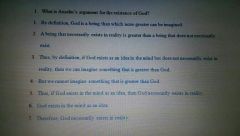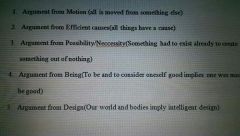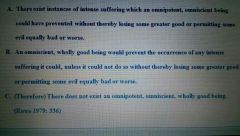![]()
![]()
![]()
Use LEFT and RIGHT arrow keys to navigate between flashcards;
Use UP and DOWN arrow keys to flip the card;
H to show hint;
A reads text to speech;
17 Cards in this Set
- Front
- Back
- 3rd side (hint)
|
Anselm's Teleological Argument |

|
The first one learned in class |
|
|
Kant's critique of Anselm |
A triangle has 3 corners. The existance of a triangle isn't neccessary to know this. Therefore, to concieve of God doesn't not mean he must exist. |
Compare God to a shape |
|
|
Aquinas' 5-way cosmological argument |

|
|
|
|
The Kalam Cosmological Argument |
1.All things existing must have a cause 2. The universe exists 3. It must have a cause. |
Think of Cause and Effect |
|
|
JL Mackie's argument against the Cosmological Argument |
We cannot understand infinites. |
"The past cannot be infinite or today would never arrive" |
|
|
PSR |
Priniciple of Sufficient Reason: everything must have a cause |
|
|
|
Paley's teleological argument |
Humanity has intelligent design, comparing the universe to human artifacts |
Think of ancient Rome, and picking out constellations |
|
|
Collin's teleological argument |
"Guided Evolution" |
God "helped" but didn't "make" |
|
|
Hume's complaint with design argument |
We cannot define what is considered "intelligent design" because we design artifacts inspired by our surroundings |
|
|
|
Dostoevsky's argument from Evil |
The death of an innocent child is an inescapable objectiont to God's goodness. |
Ivan |
|
|
Rowe's argument from Evil |

"Bad-Prevention" |
|
|
|
Leibniz's Theodicy |
God knows our world is optimal with flaws, because all possible worlds require flaws to exist. |
|
|
|
Plantinga's Theodicy |
All people are created Libertarians, to preserve free will. |
We choose to be evil |
|
|
Hicks's Theodicy |
Humanity is still in a stage of creation, still learning to live without evil. |
|
|
|
Dawkins view of Science and Religion |
Science is based on factually supported evidence, while religion and faith are based on Vice. |
|
|
|
Gould's view on Science and Religion |
Science centers on facts about the physical world, while religion focusses on human purpose and value. |
|
|
|
Pope Paul II's view on Science and religion |
Science explains how humanity biologically functions on Earth, but only religion and explain the human soul. |
|

